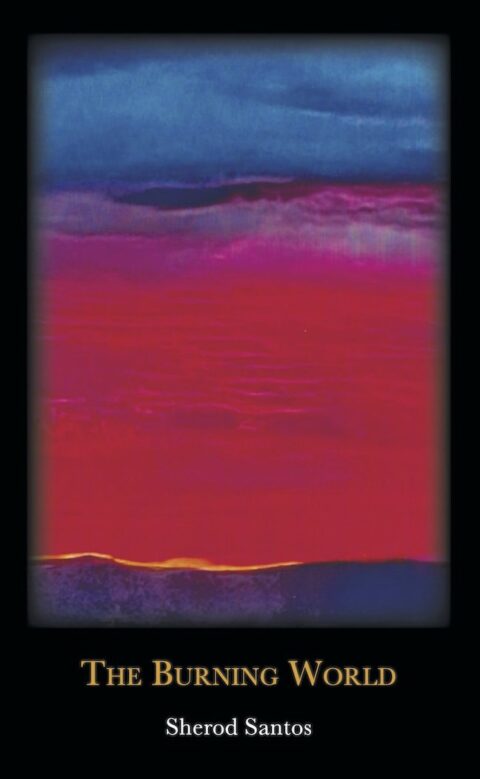 Sherod Santos’ short but ambitious new book of poems, The Burning World, witnesses to the legacy of what the poet Philip Larkin called “man handing on misery to man” in his poem “This Be The Verse.” In mostly brief lyrical poems that testify to the violence of wars and desecration throughout history, Santos takes an ambitious leap onto the public stage of the present age to update the current state of world’s dire condition. Well known for his moving elegiac and lyrical poetry in such books as A Poetry of Two Minds (2000), Greek Lyric Poetry: A New Translation (2005), The Intricate Soul: New and Selected Poems (2010), and Square Inch Hours (2017), Santos focuses in The Burning World on the apocalyptic intimations of today’s Zeitgeist with a formidable knowledge of history that recalls T.S. Eliot’s conceits in The Waste Land.
Sherod Santos’ short but ambitious new book of poems, The Burning World, witnesses to the legacy of what the poet Philip Larkin called “man handing on misery to man” in his poem “This Be The Verse.” In mostly brief lyrical poems that testify to the violence of wars and desecration throughout history, Santos takes an ambitious leap onto the public stage of the present age to update the current state of world’s dire condition. Well known for his moving elegiac and lyrical poetry in such books as A Poetry of Two Minds (2000), Greek Lyric Poetry: A New Translation (2005), The Intricate Soul: New and Selected Poems (2010), and Square Inch Hours (2017), Santos focuses in The Burning World on the apocalyptic intimations of today’s Zeitgeist with a formidable knowledge of history that recalls T.S. Eliot’s conceits in The Waste Land.
For this reason, like The Waste Land, The Burning World is a long short poem for its myriad allusions and cultural references, both mythological and actual. While Eliot requires a vast historical knowledge of his reader to grasp the diachronic arc of his archetypal touchstones, religious tropes, and mythopoetic fragments, Santos updates Eliot’s 1922 commentary on the wounded world following World War I a century later with this ominous prefatory announcement:
Nothing much left to talk about
beyond the iron law the hero
butchered on the battlefield pierced
through the ankles tendons ankle-
to-heel no different now
… and then follows it up with this rhetorical question which personifies the human “story” as a fateful narrative that is predetermined by “wayward gods’:
will the story never stop
to read our minds to mark our place
in the margins and set aside
the wayward gods clairvoyants made
a metaphor for who we are?
The question Santos asks in the last line of the above stanza allows for the possibility that “the story” will cease from reading “our minds” rather than the other way around, although the likelihood of this happening appears increasingly unlikely as Santos’ mantic witness to bloody history so vividly betrays, militating as it does also against mere pessimism. Santos reminds his reader that what Xenophon wrote in his Anabasis could be as true today as it was in Xenophon’s time:
A great principle of violence dictated our fashions
And this was no time to tell us no
what passed for empire
nomad law declared our common ground.
The oracular imagery in The Burning World pierces the reader’s heart and psyche with what Ezra Pound called simultaneous “emotional and intellectual” complexity. In the context of Santos’ eschatological vision of the world’s critical mass of political and environmental crises, his stark imagery sounds dire alarms with apocalyptic evidence:
By Now The Black Flag Waved
Highlighted by magnesium flares
the shoreline tided in ruin
the scansion of oar strokes
pilot whales tow heavenward
***
Where Once A Tree With Green Buds
Rolled molten metal roofs Remnants of cinder
the conflagration was. Trees but not the shadows
of trees. Hard scrabble, shell-money, knucklebone
foraged from the burn
cowbirds circling the kneeling pilgrims.
***
The hum of flies for the lionhearted were purified
And set afloat. Barrel fires roasting nightingales.
Bottle glass in the ditch of thieves. The hum
Of flies from a decommissioned satellite dish.
Another flag, another ruin, another marble god.
Another man’s version of the promised land.
(from “On The Battery Side Of The Island”)
“I’ve seen creosoted Hebron skies
Afghan skies that burn all night
like something wired. Beneath
a Kurdish sun. I’ve seen a woman
with an infant in a burlap bag.
And yet, despite the occasional suicide bomb …”
 Not since W.S. Merwin’s The Lice has an American poet written as prophetically as Santos has in The Burning World. His eloquent witness to the quickening evanescence of the Earth, along with so-called civilization, haunts his reader with the paradoxical vision of the proverbial blind prophet who “sees.” Santos has commented in an interview that he “thinks of his books as “bracketed obsessions — bracketed by time or circumstance — and that writing each book [has been] an attempt to interrogate, elaborate, and examine each obsession.” His “obsession” in The Burning World betrays a formidable ambition to “testify” beyond his personal griefs to grief for the world itself, along with his concomitant observations of just what’s burning. After announcing ironically at the outset that there’s “nothing much left to talk about,” Santos has indeed succeeded in “talking” in a most timely and vatic way about the world afire to capture a visible specter of the eschaton.
Not since W.S. Merwin’s The Lice has an American poet written as prophetically as Santos has in The Burning World. His eloquent witness to the quickening evanescence of the Earth, along with so-called civilization, haunts his reader with the paradoxical vision of the proverbial blind prophet who “sees.” Santos has commented in an interview that he “thinks of his books as “bracketed obsessions — bracketed by time or circumstance — and that writing each book [has been] an attempt to interrogate, elaborate, and examine each obsession.” His “obsession” in The Burning World betrays a formidable ambition to “testify” beyond his personal griefs to grief for the world itself, along with his concomitant observations of just what’s burning. After announcing ironically at the outset that there’s “nothing much left to talk about,” Santos has indeed succeeded in “talking” in a most timely and vatic way about the world afire to capture a visible specter of the eschaton.
[Published by Arrowsmith Press on May 1, 2023, 62 pages, paperback $18.00 US]